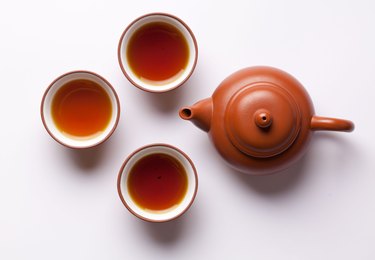
Although tea gets a lot of praise for its potential to boost your health, there are times when a freshly steeped cup isn't the best option for you. Chinese tea benefits encompass a broad range, but relying on tea to be a cure-all could be dangerous.
Many distributors want to make you believe that tea is far more powerful than it is. An international brand called Greenlife Herbal Network carries a product called Chinese Royal Tea with side effects or health hazards that are difficult to discern because they aren't available on its site. Other tea products are marketed as an alternative to traditional medicines, but that doesn't mean they're effective.
Video of the Day
Video of the Day
Chinese Tea Benefits and Drawbacks
This isn't to say that tea isn't healthy — it is! Belief in the health advantages of tea trace back to ancient times, when tea was prominently consumed in China, but modern science is finding plenty of evidence to support the idea of Chinese tea benefits.
According to a review published in June 2014 in Current Pharmaceutical Design, compounds in green and black tea are beneficial because they prevent cardiovascular disease, could fight aging and diabetes, and stave off chronic conditions like cancer.
But sometimes claims about these health benefits get taken to the extreme, as seen with Greenlife's Chinese Royal Tea, which calls itself a "top-notched remedy for weight management" and says it "slims you down through a much healthier way."
Other claims include the prevention of obesity, the treatment of diabetes, holistic internal detoxification, purification and cleansing.
As for Chinese Royal Tea side effects? It's hard to say, because there are none listed on the site — nor is there an ingredient list to help consumers determine the active ingredients that provide these great Chinese tea benefits. The worst of the Chinese Royal Tea side effects, however, might be no effect at all when consumers are counting on it to improve their health.
Such is a big risk of herbal remedies, which the U.S. National Library of Medicine defines as plants that are used as medicine and touted as an alternative way to prevent or cure disease, such as Chinese Royal Tea does. Because herbal remedies are not regulated like medicine, they are not tested as rigidly and may not work as claimed. In fact, big claims such as the ones made by Chinese Royal Tea are usually indicative that the product won't live up to its hype.
What About Herbal Teas?
The U.S. and international markets also carry many herbal teas, although they are not actually made from tea leaves but instead made from roots, berries, flowers, seeds and other plants. Many herbal teas are regarded as having health benefits just as black and green tea do, but consumers should again use discretion.
It's especially important to be careful about use of herbal treatments during times of sensitive health, such as during pregnancy. As the American Pregnancy Association points out, herbal teas are often touted as beneficial for women during pregnancy, but not all herbal teas affect the body the same way.
Tea made from red raspberry leaf is beneficial during pregnancy because it promotes uterine health, and peppermint tea, lemon balm tea and ginger root tea are all likely or possibly safe; however, dandelion tea, chamomile tea, nettles tea, rose hips tea, alfalfa tea and yellow dock tea should all be avoided because they are either deemed unsafe or have insufficient evidence to support their safety.
Although the American Pregnancy Association doesn't provide word on lavender tea during pregnancy, a study published in the December 2015 issue of Worldviews on Evidence-Based Nursing looked at a small group of 80 Taiwanese postnatal women to determine how lavender tea affects maternal-infant attachment after birth.
The study did not give any indication on beneficial connection between lavender tea and pregnancy, but it did find that drinking lavender tea could provide short-term better connection between mother and child.
Tea is a great beverage, and evidence suggests it has many benefits, but you shouldn't count on it to be a cure-all or an alternative to medicine. Instead, incorporate it into a healthy lifestyle and avoid any teas that make too-good-to-be-true health claims.
- The U.S. National Library of Medicine: “A Guide to Herbal Remedies”
- Greenlife Herbal Network: “Greenlife Chinese Royal Tea”
- Worldviews on Evidence-Based Nursing: “Effects of Lavender Tea on Fatigue, Depression, and Maternal-Infant Attachment in Sleep-Deprived Postnatal Women”
- Current Pharmaceutical Design: “Tea and Health: Studies in Humans”
- American Pregnancy Association: "Drinking Herbal Tea During Your Pregnancy"